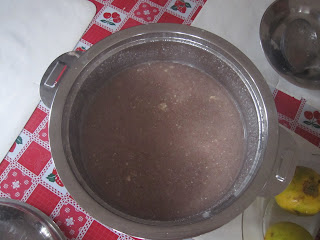With Frida, our homestay mother, in tow, we woke up to complete darkness at 5:40 a.m. We wandered outside the gate and hoped the taxi driver we had contacted the night before would arrive on time.
He didn't. But we still arrived at the taxi park before six and met with Francis and Dr. Lockhart, a government agricultural officer. Francis suggested that we bring along Dr. Lockhart to "give him enough rope to hang himself to the project" -- a malapropism that reminded Sam of his ninth grade English teacher who offer students "enough rope with which to hang themselves." Unfortunately, our trip to Arusha did not began without a hitch since the representative from Sia Primary School failed to show up. Putting aside our concern that such an integral member was missing, we saw our first African sunrise en route to Arusha. The hour-long skip to Arusha was the first leg of our trip. We proceeded with a 170 km (that would be kilometers for those of you reading for the glorious motherland) jump to our eventual destination of Babati. The second leg was a turbulent ride on unpaved road spent hopping on two benches in the back of a Land Cruiser we chartered from Arusha.
Joining us for this stage was Mr. Ringo and three development professionals from his firm -- two of whom were stuck in the trunk with us and privy to our countless questions. The torturous ride served as a waterboarding of sorts. We took advantage of their confinement and expertise during the 2.5 hour ride/interrogation. The fact that Mr. Ringo slashed the typically three hour ride by half an hour is a testament to his need for speed. The way in which he pushed the agility of the car was straight out of Grand Theft Auto.
We shared our fear of helping those not in need of help with the development professionals. They offered various categories of wealth measurement we could apply to our target population to determine economic status accurately. For instance, land acreage, source of fodder, type of house, mode of transport, and level of education among other things.
Typically when NGOs go house to house surveying economic means, respondents exaggerate their poverty to dupe researchers into offering undue aid. To stifle this effect, we postponed Tuesday's meeting with Sia School parents, during which we were going to begin discussing our project. Rather, we are recruiting six high achieving secondary school students to facilitate wealth/means assessment focus group discussions with the parents. Instead of interviewing multiple households, respondents discuss what rich, middle-class, and poor means to them.
Asking people to define wealth in culturally relevant terms elicits a set of categories we can use to determine the relative affluence of any given household. We can also use these categories to set criteria for inclusion in our project, which will allow us to narrow our target population. This is critical since our funding will only allow us to offer "direct intervention" in about sixteen households. Since we don't want to direct resources to those who are relatively affluent or those unable to assimilate a capital injection efficiently (aka pay back a loan), we are going to set two benchmarks in each category the community deems important. As a quick example using arbitrary numbers, if someone has a farm of under a half acre, they are unlikely to be able to care for a goat. But if they already have three acres, it may signify that they don't need our help. So we might target those who have over half-acre but under three-acre farms.
Quite an informative backseat ride as you can seen. We arrived in Babati and met with Farm Africa, an organization similar to Heifer that works with goats and through agricultural collectives. About ten years ago, FA launched a project meant to ameliorate rampant malnutrition in Babati. Farmers there told researchers they wanted to work with cows. Citing the relative ease of raising goats, FA asked members of the target population if they would be interested in using these smaller, more durable animals instead of the traditionally better-respected cow. Babati residents agreed, and FA introduced Tanzanian farmers and English Togenberg goats to one another. Despite the risky blind date, both seemed to have thrived: Babati's goat farmers, mostly women, have organized themselves into a cartel of sorts. They use their collective to protect the breed and perhaps more importantly, to set prices. They keep 100%, 75%, and 50% Togenbergs. The remainder of the goats consist of native genes. The women take care of all the business while FA, having trained them, has relegated itself to a technical advisory role.
We met a farmer who told us the goats have helped cut poverty and improve peoples' quality of life. She, for example, has used income from the goats to rebuild her house, add chicken, pig, and rabbit projects, build new toilets, and pay school fees. Next month she is planning to sell a few Togenbergs at $400 a pop to buy a TV.
The coolest thing about the goats aside from their knack for saving the world? Their pupils: every goat has a pair of enchanting deep-brown eyes with black insets that look like miniature barbells with a horizontal strip capped by two vertical pillars on each side.
Relations are thawing between Duma and ourselves. When we told Francis our idea for the focus group discussions, we were expecting some resistance given her overeager approach to breaking ground. Struggling to explain our rationale for extending focus group talks with the community, we were overjoyed when she said, "I will give you the cat but I don't need to see the rat."
We're going to have to start writing down these catch phrases.











